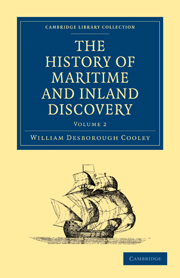Book contents
- Frontmatter
- Contents
- CHAP. I COLUMBUS
- CHAP. II COLUMBUS AND AMERIGO VESPUCCI
- CHAP. III EARLY DISCOVERIES IN AMERICA
- CHAP. IV SPANISH DISCOVERIES, AND FIRST CIRCUMNAVIGATION OF THE EARTH
- CHAP. V FERNANDO CORTEZ
- CHAP. VI CONQUEST OF PERU
- CHAP. VII CONQUESTS OF THE SPANIARDS
- CHAP. VIII CONQUESTS OF THE PORTUGUESE
- CHAP. IX FERDINAND MENDEZ PINTO
- CHAP. X VOYAGES TO THE NORTH
- CHAP. XI VOYAGES TO THE NORTH
- CHAP. XII VOYAGES TO THE NORTH
- CHAP. XIII SETTLEMENTS IN THE EAST
- CHAP. XIV SETTLEMENTS IN NORTH AMERICA
- CHAP. XV ESTABLISHMENTS IN AFRICA
- CHAP. XVI VOYAGES TO THE SOUTH SEA
- CHAP. XVII VOYAGES TO THE SOUTH SEA
- CHAP. XVIII VOYAGES IN THE PACIFIC, AND DISCOVERY OF AUSTRALIA
- CHAP. XIX EXPEDITIONS OF THE BUCCANEERS IN THE SOUTH SEAS
- CHAP. XX VOYAGES OF PRIVATEERS AND OTHERS TO THE SOUTH SEA
- CHAP. XXI DISCOVERIES OF THE RUSSIANS
- CHAP. XXII DISCOVERIES OF THE RUSSIANS
CHAP. XXI - DISCOVERIES OF THE RUSSIANS
Published online by Cambridge University Press: 05 October 2010
- Frontmatter
- Contents
- CHAP. I COLUMBUS
- CHAP. II COLUMBUS AND AMERIGO VESPUCCI
- CHAP. III EARLY DISCOVERIES IN AMERICA
- CHAP. IV SPANISH DISCOVERIES, AND FIRST CIRCUMNAVIGATION OF THE EARTH
- CHAP. V FERNANDO CORTEZ
- CHAP. VI CONQUEST OF PERU
- CHAP. VII CONQUESTS OF THE SPANIARDS
- CHAP. VIII CONQUESTS OF THE PORTUGUESE
- CHAP. IX FERDINAND MENDEZ PINTO
- CHAP. X VOYAGES TO THE NORTH
- CHAP. XI VOYAGES TO THE NORTH
- CHAP. XII VOYAGES TO THE NORTH
- CHAP. XIII SETTLEMENTS IN THE EAST
- CHAP. XIV SETTLEMENTS IN NORTH AMERICA
- CHAP. XV ESTABLISHMENTS IN AFRICA
- CHAP. XVI VOYAGES TO THE SOUTH SEA
- CHAP. XVII VOYAGES TO THE SOUTH SEA
- CHAP. XVIII VOYAGES IN THE PACIFIC, AND DISCOVERY OF AUSTRALIA
- CHAP. XIX EXPEDITIONS OF THE BUCCANEERS IN THE SOUTH SEAS
- CHAP. XX VOYAGES OF PRIVATEERS AND OTHERS TO THE SOUTH SEA
- CHAP. XXI DISCOVERIES OF THE RUSSIANS
- CHAP. XXII DISCOVERIES OF THE RUSSIANS
Summary
Russia in the beginning of the sixteenth century was little better than an inland kingdom; the small extent of sea-coast which it had upon the north offering at that time no means of intercourse with foreign nations. The arrival of Richard Chancelor at Archangel was looked upon in Russia as a wonderful event; and the commercial privileges accorded by the czar to the English seaman were intended as a reward for his having discovered a communication between the North Sea and the Atlantic Ocean. The solution of the question respecting a north-east passage would have been of the greatest importance to Russia, if that empire had been in a condition to carry on foreign commerce; but the Russian empire, at present so powerful, was too feeble two centuries ago to support or feel an interest in maritime expeditions. Even in the beginning of the seventeenth century, nothing was known of the northern coast of Siberia beyond the river Yenisei. The country was unquestionably often traversed by private hunters and adventurers; but their local information was never drawn together or concentrated in such a way as to serve materially the interests of geography.
In a country where population is thin and society ill organised, conquest is sure to follow discovery. The Russians seem to have had the same advantage over the wild tribes or nations dwelling to the east of them, which the Spaniards possessed over the natives of America.
- Type
- Chapter
- Information
- The History of Maritime and Inland Discovery , pp. 329 - 342Publisher: Cambridge University PressPrint publication year: 2010First published in: 1830



